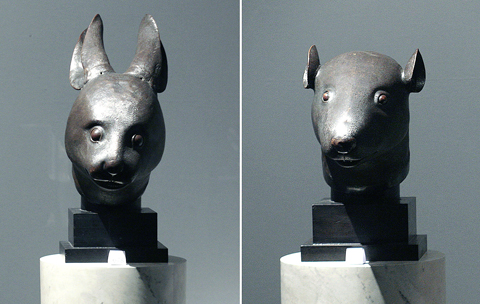The fate of two bronze statues stolen from China 150 years ago became the subject of discussion yesterday after it was revealed that the National Palace Museum had turned down an offer for the artifacts from their French owner.
Pierre Berge, partner of late French fashion designer Yves Saint Laurent, said he offered the two bronzes in the shape of a rat’s head and a rabbit’s head to a Taiwanese museum, but was rejected because the museum feared triggering Chinese anger.
“I wanted to give them to the Taiwan museum, but they didn’t want to create a bone of contention ... with China,” Berge told French radio station RTL in a program aired on Monday.

PHOTO: AFP
Berge did not name the museum, but the Chinese-language Liberty Times (the Taipei Times’ sister paper) yesterday quoted the National Palace Museum as saying it turned down the gift because “the artifacts didn’t fit its collections.”
The museum later said it was never approached by Berge but would turn down the offer for that reason if it ever were, the newspaper said.
National Palace Museum Director Chou Kung-hsin (周功鑫) reiterated that position yesterday on the legislative floor, saying that the museum needed to follow professional ethics and reject any artifacts that were “controversial,” “of unknown origin” or “stolen goods.”
“Once a collector wanted to donate an artifact to the Metropolitan Museum of Arts, but the museum declined the offer in the end because the artifact was of unknown origin,” Chou told Democratic Progressive Party (DPP) Legislator Huang Wei-cher (黃偉哲) during an interpellation session.
Chou said she met Berge on June 25 in Paris and at that time Berge said he would neither donate the bronzes nor sell them.
The two artifacts, looted from the imperial Summer Palace in Beijing by British and French troops in 1860, became the subject of controversy during the Yves Saint Laurent art auction in Paris in February.
Mystery bidders paid 15.7 million euros (US$20.3 million) for each of the heads on Feb 25, but the bidders were later found to be a Chinese collector, who then refused to pay.
China lambasted auction house Christie’s when the statues were auctioned, saying that the artifacts should be returned to China.
Chinese Nationalist Party (KMT) Legislator Lee Ching-hua (李慶華) said the museum should not reject the bronzes if it had the opportunity to add them to its collection.
Huang also said the museum should accept them.
“If he was willing to give them, why didn’t we accept them?” Huang said.
Facing criticism from lawmakers, Premier Wu Den-yih (吳敦義) said he would ask the museum to review its decision.
Meanwhile, the National Museum of History said it was “very willing to accept” the relics, director Huang Yung-chuan (黃永川) told reporters yesterday.

MORE VISITORS: The Tourism Administration said that it is seeing positive prospects in its efforts to expand the tourism market in North America and Europe Taiwan has been ranked as the cheapest place in the world to travel to this year, based on a list recommended by NerdWallet. The San Francisco-based personal finance company said that Taiwan topped the list of 16 nations it chose for budget travelers because US tourists do not need visas and travelers can easily have a good meal for less than US$10. A bus ride in Taipei costs just under US$0.50, while subway rides start at US$0.60, the firm said, adding that public transportation in Taiwan is easy to navigate. The firm also called Taiwan a “food lover’s paradise,” citing inexpensive breakfast stalls

TRADE: A mandatory declaration of origin for manufactured goods bound for the US is to take effect on May 7 to block China from exploiting Taiwan’s trade channels All products manufactured in Taiwan and exported to the US must include a signed declaration of origin starting on May 7, the Bureau of Foreign Trade announced yesterday. US President Donald Trump on April 2 imposed a 32 percent tariff on imports from Taiwan, but one week later announced a 90-day pause on its implementation. However, a universal 10 percent tariff was immediately applied to most imports from around the world. On April 12, the Trump administration further exempted computers, smartphones and semiconductors from the new tariffs. In response, President William Lai’s (賴清德) administration has introduced a series of countermeasures to support affected

CROSS-STRAIT: The vast majority of Taiwanese support maintaining the ‘status quo,’ while concern is rising about Beijing’s influence operations More than eight out of 10 Taiwanese reject Beijing’s “one country, two systems” framework for cross-strait relations, according to a survey released by the Mainland Affairs Council (MAC) on Thursday. The MAC’s latest quarterly survey found that 84.4 percent of respondents opposed Beijing’s “one country, two systems” formula for handling cross-strait relations — a figure consistent with past polling. Over the past three years, opposition to the framework has remained high, ranging from a low of 83.6 percent in April 2023 to a peak of 89.6 percent in April last year. In the most recent poll, 82.5 percent also rejected China’s

PLUGGING HOLES: The amendments would bring the legislation in line with systems found in other countries such as Japan and the US, Legislator Chen Kuan-ting said Democratic Progressive Party (DPP) Legislator Chen Kuan-ting (陳冠廷) has proposed amending national security legislation amid a spate of espionage cases. Potential gaps in security vetting procedures for personnel with access to sensitive information prompted him to propose the amendments, which would introduce changes to Article 14 of the Classified National Security Information Protection Act (國家機密保護法), Chen said yesterday. The proposal, which aims to enhance interagency vetting procedures and reduce the risk of classified information leaks, would establish a comprehensive security clearance system in Taiwan, he said. The amendment would require character and loyalty checks for civil servants and intelligence personnel prior to